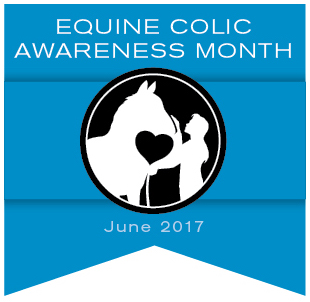by Jenn from Green Slobber on My Shirt. Thanks Jenn for allowing us to re-post your story, thoughts and questions here! Be sure to stop by the Green Slobber on my Shirt blog and follow Jenn’s adventures with her thoroughbred Gabe.
Sometimes it seems that no matter what precautions you take, how hard you work to keep your horses’ living space as safe as possible or the efforts you make to keep them as healthy and happy as possible, something is bound to go wrong.
That’s why it’s a common theory that even wrapping our equine friends up in bubble wrap and keeping them in a padded stall wouldn’t make a difference. They’d still manage to find a way to injure or sicken themselves. I’m pretty sure most of them are subconsciously suicidal.
Gabe colicked last weekend.
Colic is a horse owner’s worst nightmare, in my opinion. I’ve lost two wonderful horses to colic and it’s not something I ever take lightly. You never know whether your colicking horse simply has a little painful gas or something far worse, like a twisted gut or perforated intestine.
You just never know. And often you just never know what causes it. For such powerful, beautiful, wonderful animals, horses sure are delicate creatures.
I knew instantly when I saw him Saturday morning that things were not right in Gabe’s world. One more advantage to having them at home: I know them, I know how they typically behave and I know something is wrong where someone else might not immediately recognize subtle signs and changes.
Gabe had all the classic colic symptoms: He was biting at his side, anxious, throwing himself to the ground, laying out flat then getting up to throw himself down again, walking in circles, pawing, sweating, breathing hard and obviously in pain.
He had almost no gut sounds on one side and very weak gut sounds on the other. He passed a few very hard, dry poop balls and it took him some effort to do even that.
There was no question in my mind that he was colicking and also no question that the vet would be called.
But I always wonder whether or not I should dose a colicking horse with Banamine before I call the vet. Will the Banamine mask symptoms? Am I doing additional harm to a horse who may already be dehydrated?
My mom is a vet, but unfortunately lives all the way on the other side of the country, so having her come out to treat my horses is kind of out of the question.
But I can call for advice and call I did. I guess it was about 5 a.m. her time and I woke her up, but thankfully, hearing her voice on the other end calmed me down and helped me think more clearly.
No Banamine, she advised, unless my vet gave the okay.
Thankfully my vet is only 15 minutes away from my farm, so he was there pretty quickly. By that time Gabe was feeling a bit better, but still, I don’t mess around with colic and I take no chances.
Poor guy was subjected to the indignity of a rectal exam and a tube up his nose for a good dose of oil. He got a sedative and a pain reliever and was pretty out of it but started to really feel better a couple of hours later.
The vet found no distended intestine indicating gas, nor could he find any twisted gut. So, who knows what caused Gabe so much pain.
But what if he HAD had a twisted gut and needed surgery to fix it? Would I put him through a major surgery?
This is something all horse owners should ask themselves before it happens and really think about what it logically and honestly before faced with it emotionally.
My answer is no, I wouldn’t. For all of my horses. The answer to colic surgery will always be no in my book. And it’s not because I don’t love my horses and not because I wouldn’t be heartbroken to have to make that decision, but considering it now, before I have to make that kind of decision, I know it would be the wisest and best one to make.
Not only do I not have the facilities to keep a horse on stall rest for months, but I also know any one of mine would be absolutely miserable locked up for months and the possibility of developing other post-surgical complications is likely.
Colic surgery is not only incredibly expensive, it is also incredibly risky and there is no guarantee that the horse won’t colic again and no guarantee that he will survive the surgery and healing process either.
I hope I never, ever have to make that decision, but at least I know what that decision would be if it came down to it.
What would you do if faced with that decision?







I made this decision yesterday for my childhood friend of 18.5 years. In fact I made it a few years ago… So when the time came, right out of the blue, I had the courage to do the right thing for my wonderful pony despite the hole it has left in my heart. It gives me some comfort that I didn’t put him through any unnecessary suffering for my own selfish gain. I hope everyone reads this post and is prepared to do the same for their babies should the need ever arise (god forbid) xxx